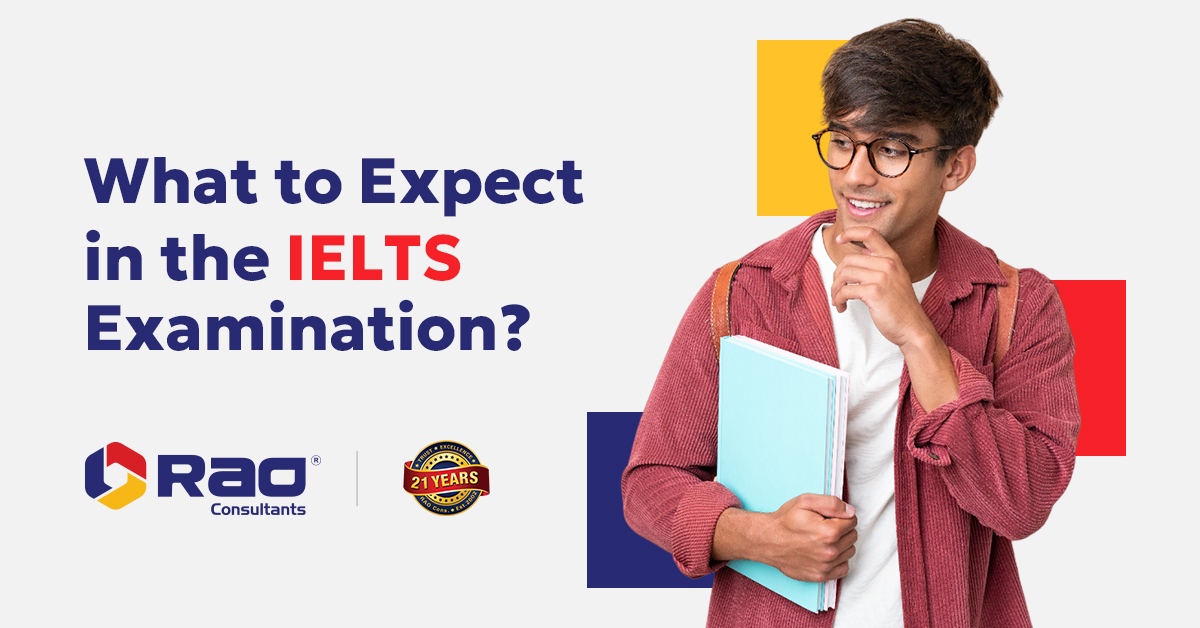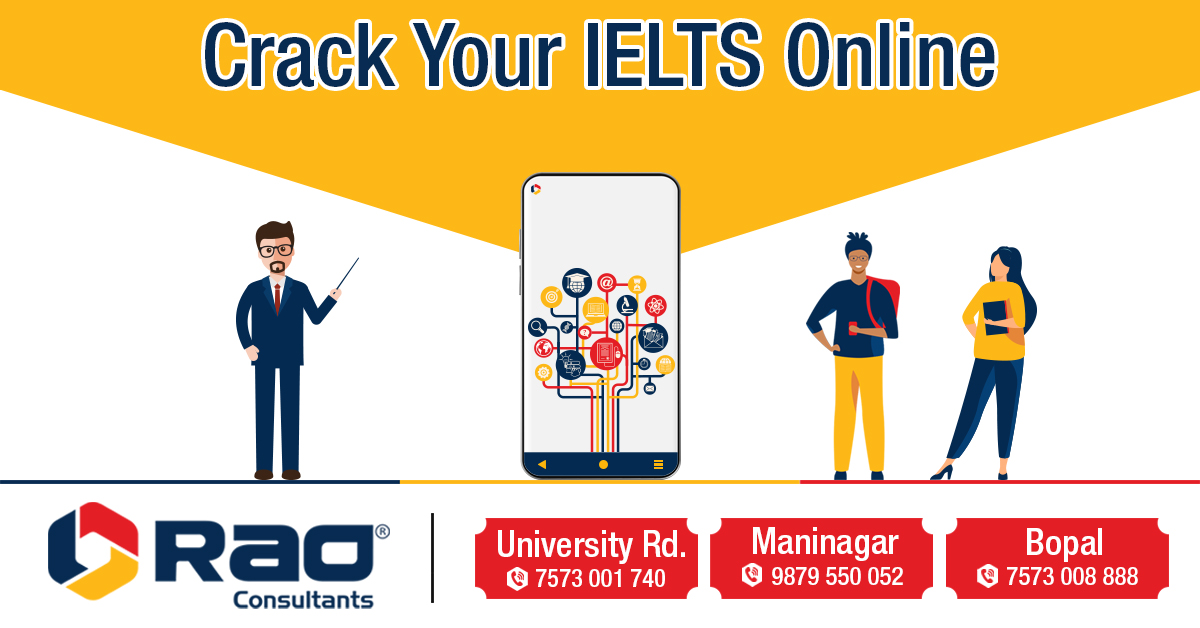Any competitive exam can be overwhelming because, apart from the results, it also carries expectations of others; your career depends on the same, and most of your decisions revolve around that exam. And when you look for guidance on doing well in the exam, it can often leave you confused with differing opinions and tips for scoring well in PTE?
Don’t worry! You only need to refer to this comprehensive guide on cracking the PTE exam. At Rao Consultants, we understand that achieving a high score on the PTE exam can open doors to global opportunities in education and career. We have covered everything you need to take care to ace PTE with a score of 79 or above. Let’s dive in!
What is PTE?
The Pearson Test of English Academic (PTE Academic) is a computer-based English language test designed to assess the readiness of a non-native English speaker to participate in a university-level English language instruction program. The test evaluates the four primary language skills: Listening, Reading, Speaking, and Writing.
What Does PTE Test?
The PTE test is structured to evaluate your English proficiency in a comprehensive manner. Here’s what each section tests:
- Speaking: Assesses your ability to speak fluently, clearly, and accurately. This section includes tasks like reading aloud, repeating sentences, describing images, and answering short questions.
- Writing: Tests your ability to construct coherent and grammatically correct written responses. Tasks include summarizing written texts and writing essays.
- Reading: Evaluates your reading comprehension skills through multiple-choice questions, reordering paragraphs, and filling in the blanks.
- Listening: Measures your ability to understand spoken English in various accents and contexts. Tasks involve summarizing spoken texts, multiple-choice questions, and filling in the blanks based on audio clips.
Decoding the PTE Exam Pattern & Structure
Understanding the structure of the PTE exam is crucial for effective preparation. The PTE Academic is divided into three main parts, each focusing on different skills:
- Speaking & Writing (54–67 minutes): Includes 5 speaking tasks from personal introduction, read aloud, repeat sentence, describe image, re-tell lecture, answer short questions, and 2 writing tasks – summarize written text, and essay.
- Reading (29–30 minutes): Comprises multiple-choice questions, re-order paragraphs, and fill in the blanks.
- Listening (30–43 minutes): Involves summarizing spoken text, multiple-choice questions, fill in the blanks, highlight correct summary, select missing word, highlight incorrect words, and write from dictation.
Each section is designed to test specific skills, and knowing what to expect can help you prepare more effectively.
Crafting Your Study Plan
A well-structured study plan is the backbone of PTE preparation. Here’s how you can craft an effective plan:
- Set Clear Goals: Determine your target score and set milestones to track your progress. Break down the overall goal into smaller, manageable objectives.
- Understand the Test Format: Familiarize yourself with the exam structure and types of questions. Understanding what each section entails helps in planning specific strategies.
- Allocate Study Time: Dedicate specific hours each day to practice for each section of the test. Consistency is the key. Create a timetable that balances all sections.
- Use Quality Study Materials: Invest in reliable PTE preparation books and practice tests. Use a mix of materials to get a well-rounded understanding.
- Periodic Reviews: Regularly review what you’ve learned to ensure retention. Weekly or bi-weekly revisions help in reinforcing the material.
- Simulate Exam Conditions: Practice under exam-like conditions to build familiarity and reduce anxiety. Timed practice sessions can help in managing time effectively during the actual test.
- Incorporate Breaks: Schedule short breaks to avoid burnout. Balanced study sessions with breaks can improve focus and efficiency.
- Use a Study Diary: Maintain a study diary to track your progress and areas needing improvement. Reflect on your daily study sessions to identify what works best for you.
- Join a Coaching Center: Consider enrolling in a PTE coaching center like Rao Consultants for expert guidance and structured learning. Coaching centers offer tailored study plans and access to experienced trainers. They assist you with all the above points.
Mastering the Speaking Section
The speaking section tests your fluency, pronunciation, and coherence. Here are some strategies to excel:
- Practice Regularly: Consistently practice speaking English to improve fluency and confidence. Engage in conversations in English as much as possible. Daily practice helps in reducing anxiety and builds confidence and memory for fluent speech.
- Record Yourself: Recording your responses can help you identify areas for improvement. Listen to your recordings and track your progress. This self-assessment helps in recognizing pronunciation errors, gaps in fluency and areas needing more clarity.
- Focus on Clarity: Speak clearly and at a moderate pace. Avoid speaking too fast as it can lead to mispronunciation and loss of coherence. Clear articulation ensures that the automated scoring system accurately captures your response.
- Use Natural Intonation: Pay attention to the natural rise and fall of your voice to sound more engaging. Monotonous speech can negatively impact your score as it indicates a lack of expression and engagement.
- Expand Vocabulary: Regularly learn new words and phrases. A rich vocabulary helps in expressing ideas more effectively and adds variety to your responses. Use flashcards or vocabulary apps to build your lexicon.
- Feedback and Improvement: Seek feedback from teachers or peers. Constructive criticism can help you refine your speaking skills. Feedback sessions highlight your strengths and pinpoint areas for development.
- Practice Pronunciation: Use online tools and apps to practice pronunciation. Correct pronunciation is crucial for scoring well, as mispronounced words can lead to misunderstandings. Phonetic exercises and pronunciation guides can be particularly helpful.
Strategies for the Writing Section
Writing well-structured and grammatically correct responses is key. Follow these tips:
- Practice Summarizing: Work on summarizing complex texts in a concise manner. Focus on capturing the main ideas and essential details. Summarizing exercises help in developing the skill to distill information effectively.
- Essay Writing: Practice writing essays on various topics. Focus on structure, coherence, and argumentation. Develop a clear introduction, body, and conclusion. Ensure that each paragraph transitions smoothly to maintain the flow.
- Time Management: Allocate specific time to plan, write, and review your essays. Use the first few minutes to outline your thoughts before writing. Planning helps in organizing your essay and ensuring all points are covered.
- Grammar and Punctuation: Pay attention to grammar, punctuation, and spelling. Errors can significantly lower your score. Use grammar check tools to practice and refine your writing.
- Vocabulary Usage: Use a varied vocabulary to make your writing more engaging. Avoid repetition of words and phrases. Incorporate synonyms and advanced vocabulary to enhance the quality of your writing.
- Review and Edit: Always leave a few minutes at the end to review and edit your work. Look for and correct any mistakes. This step is crucial for catching errors you might have missed initially.
- Sample Essays: Read high-scoring sample essays to understand what is expected. Analyze their structure and style to gain insights into effective essay writing.
- Practice Typing: Since the PTE is a computer-based test, fast and accurate typing is essential. Practice typing essays within a set time limit to build speed and efficiency.
- Outline Before Writing: Spend a few minutes outlining your essay before you start writing. This helps in organizing your thoughts and ensuring a coherent structure.
- Argument Development: Make sure your arguments are well-developed and supported by examples. Strong arguments contribute to a higher score by demonstrating critical thinking and coherence.
- Use Transitional Phrases: Use transitional phrases to ensure smooth flow between paragraphs. This enhances the readability of your essay and helps in maintaining a logical progression of ideas.
Strategies for Reading Passage
Reading comprehension requires careful analysis of the text. Here’s how to tackle it:
- Skim and Scan: Quickly skim through the passage to get a general idea before diving into detailed reading. This helps in understanding the context and main ideas, making it easier to locate specific information later.
- Highlight Key Points: Mark important information and keywords while reading. This makes it easier to refer back when answering questions. Underlining or annotating key points helps with quick reference and saves time.
- Practice Regularly: Regular practice of different types of reading passages improves speed and accuracy. Use practice tests to familiarize yourself with the question types and develop effective reading strategies.
- Improve Vocabulary: A strong vocabulary helps in understanding complex texts. Make a habit of learning new words daily. Using vocabulary apps and flashcards can be beneficial.
- Understand Question Types: Familiarize yourself with the different question types in the reading section. Knowing what to expect can help you approach each question more effectively and reduce anxiety.
- Critical Thinking: Develop critical thinking skills to analyze and interpret the text. Look beyond the surface meaning to understand underlying themes and ideas. This skill is crucial for answering inference and summary questions.
- Annotate the Text: Make notes or annotations on the text to track important points and arguments. This can help in quickly locating information during questions and enhances comprehension.
- Practice Inference Questions: Inference questions require you to read between the lines. Practice these questions to improve your ability to deduce information. This helps in developing analytical skills and deeper understanding.
- Summarize Paragraphs: Summarize each paragraph in a few words or sentences. This helps in understanding the overall structure and key points of the passage. Summarization aids in retention and recall of information.
Mastering the Listening Section
To ace the listening section, you need to understand various English accents and contexts:
- Active Listening: Practice active listening by focusing on understanding the main ideas and details. Engage in exercises that require you to summarize or paraphrase what you hear. Active listening builds comprehension and retention skills.
- Take Notes: Develop a shorthand for taking quick and effective notes during the listening tasks. Focus on key points and avoid writing down everything verbatim. Effective note-taking helps in capturing essential information without getting overwhelmed.
- Practice with Different Accents: Listen to English content from different regions to get accustomed to various accents. Podcasts, news broadcasts, and TV shows are great resources. Exposure to different accents reduces the difficulty of understanding diverse speakers during the test.
- Use Subtitles: Initially, use subtitles to understand different accents and gradually wean off as you get more comfortable. This helps in acclimatizing to different speech patterns.
- Summarize: After listening to an audio clip, summarize it in your own words. This helps in retaining information and improving comprehension. Summarizing exercises reinforce listening skills and information retention.
- Multiple-choice: Attempt multiple-choice listening questions to get used to the format and improve accuracy. This type of practice helps in understanding how to pick the best answer from given options.
- Regular Exposure: Make it a habit to listen to English every day. This constant exposure helps in tuning your ears to different speech patterns and speeds. Consistent listening practice builds familiarity and ease with the language.
- Practice Dictation: Write down what you hear in dictation exercises. This improves your ability to catch details and enhances your note-taking skills. Dictation practice also sharpens listening precision.
- Simulate Test Conditions: Practice listening exercises under exam-like conditions. This helps in managing time and reducing anxiety during the actual test. Simulated practice builds comfort and confidence.
- Review Mistakes: Listen to audio clips multiple times to understand where you went wrong. Reviewing mistakes helps in improving accuracy. Identifying and correcting errors is crucial for continual improvement.
Practice Makes the PTE Score Higher

Regular practice is essential to achieving a high score in PTE. Here are some ways to practice effectively:
- Mock Tests: Take full-length mock tests under timed conditions to simulate the actual exam environment. Analyze your performance to identify areas for improvement. Mock tests help in building stamina and familiarity with the test format.
- Daily Practice: Incorporate daily practice sessions for each section of the test. Consistency is key to gradual improvement. Daily practice ensures steady progress and skill reinforcement.
- Review Mistakes: Analyze your mistakes and work on the areas where you lost marks. Understanding why you made mistakes helps in avoiding them in the future. Mistake analysis is as crucial as practicing for targeted improvement.
- Variety in Practice: Use a variety of practice materials, including books, online resources, and coaching center materials. Exposure to different types of questions enhances your adaptability. Diverse practice materials broaden your preparation.
- Feedback: Seek feedback from teachers or peers on your practice tests. Constructive criticism helps in refining your skills. Feedback sessions provide insights into your performance and areas needing improvement.
- Incremental Goals: Set incremental goals to track your progress. Celebrate small achievements to stay motivated. Achievable goals keep you focused and motivated.
- Topic-Specific Practice: Focus on specific topics or question types that you find challenging. Targeted practice can help in overcoming weaknesses. Specialized practice strengthens weak areas.
- Simulated Exam Days: Plan simulated exam days where you take a full-length test in one sitting. This builds stamina and familiarity with the test format. Simulated practice reduces test-day anxiety and improves endurance.
Determine Your Strengths and Weaknesses
Identifying your strengths and weaknesses can help you focus your preparation:
- Self-Assessment: Take initial practice tests to gauge your proficiency in each section. Use this as a baseline to measure your progress. Self-assessment helps in understanding your starting point.
- Focus on Weak Areas: Devote more time to improve your weak areas while maintaining your strengths. Tailor your study plan to address specific challenges. Focusing on weaknesses ensures comprehensive preparation.
- Strengthen your Strengths: Continue to prepare and refine the areas where you are already strong. This ensures you can maximize your score in those sections. Consistent preparation maintains and enhances your proficiency.
- Regular Feedback: Seek regular feedback from teachers or peers to identify your strengths and weaknesses accurately. External insights can provide a fresh perspective. Feedback is essential for objective assessment.
- Track Progress: Keep a record of your scores and progress in each section over time. Use this data to adjust your study plan as needed. Progress tracking helps in identifying trends and areas needing more focus.
- Focus Sessions: Dedicate specific practice sessions to your weaker sections. Use targeted exercises and materials to build confidence and skill. Focused sessions ensure concentrated improvement.
- Reflect and Adapt: Reflect on your study methods and adapt them based on what works best for you. Flexibility in your approach can lead to better results. Adapting your strategy ensures it remains effective and relevant.
Time Management During Test
Effective time management is crucial for success in the PTE exam. Here’s how to manage your time efficiently:
- Know the Format: Familiarize yourself with the test format and the time allocated for each section. Understanding the structure helps in planning your time effectively.
- Timed Practice: Practice each section under timed conditions to develop a sense of pacing. This helps in managing your time during the actual test. Timed practice builds efficiency and confidence.
- Allocate Time: Allocate specific time blocks for each question type within a section. Stick to these time limits to avoid spending too long on any one question. Time allocation ensures balanced focus.
- Monitor Time: Keep an eye on the clock during the test. Regularly check the time to ensure you are on track. Time monitoring prevents last-minute rushes.
- Avoid Overthinking: Don’t spend too much time on a single question. If you’re stuck, move on and come back to it later if time permits. Overthinking can waste valuable time.
- Practice Efficiency: Develop efficient methods for answering questions. For example, use skimming techniques for reading passages and shorthand for note-taking in listening tasks. Efficient methods save time and improve accuracy.
Additional Tips to Follow for Scoring 79 in PTE
Surround Yourselves with Supportive Peers with Similar Goals
Studying with peers who have similar goals can be motivating and productive. Join study groups where you can share tips, practice together and provide mutual support. This collaborative approach can enhance your learning experience and keep you accountable. Moreover, if it feels like there are a lot of things to take care of, then you would benefit greatly from such a support system.
Be Authentic
Be yourself during the speaking and writing sections. Authenticity ensures that you are comfortable and confident in your responses. Avoid trying to mimic accents or use overly complex vocabulary that you are not familiar with. Clear, accurate, and genuine responses score better.
Manage Stress Level & Stay Healthy
Your mental and physical well-being significantly impact your performance. Ensure you get adequate sleep, eat a balanced diet, and engage in regular physical activity. Practice stress management techniques like deep breathing, meditation, or yoga to stay calm and focused during your preparation and on the test day.
Conclusion
Scoring a 79 or above in the PTE is a challenging but achievable goal with the right efforts, environment, and guidance. If you feel like you need support and help in your preparation journey, please feel free to drop us a message or call. Our expert team of counselors and faculty will gladly support you and ensure we leave no stone unturned in your preparation to achieve your target score.









